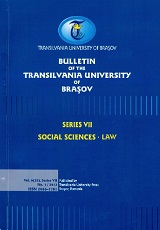General Aspects Regarding the Civil Institution of Legacy and Wills in the New Civil Code
General Aspects Regarding the Civil Institution of Legacy and Wills in the New Civil Code
Author(s): Diana-Geanina IonaşSubject(s): Law, Constitution, Jurisprudence
Published by: Editura Universitatii Transilvania din Brasov
Keywords: testament; legacy; judicial character; characters
Summary/Abstract: The testament is the unilateral, personal and reversible document through which a person called bequeather disposes in one of the forms provided by the law for the time when he/she will no longer be alive. The main object of the testaments is represented by legacies. But the legacy is the testamentary provision through which the bequeather stipulates that when he/she passes away, one or more legatees will acquire his/her entire inheritance, a part of it or certain assets. In consequence, the modality of transmission and acquiring of property is the legacy, and not the testament. That is why, in the reference books, a question often asked is the one regarding the legal character of the testament and, in consequence, its characteristic features in relation to its legal character of generosity, like donation.
Journal: Bulletin of the Transilvania University of Braşov, Series VII: Social Sciences and Law
- Issue Year: 2013
- Issue No: 1
- Page Range: 129-134
- Page Count: 6
- Language: English

